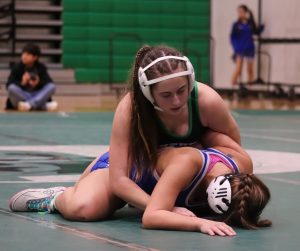Waughtal: Bipolar Disorder
Being afraid of getting help is OK
December 16, 2021
When I was around 6 years old, I sat in my room bawling and ripping out my hair, wishing to not be alive anymore. If it wasn’t insufferable thoughts of hurting myself weighing me down, I was a ball of energy, in a state of euphoria I couldn’t seem to escape.
These are my earliest memories of depression, mania and anxiety. At 16 years old, my psychiatrist diagnosed me with bipolar disorder and generalized anxiety disorder.
To be this vulnerable in front of my peers is scary, but I believe I won’t be looked at differently. Everyone has a mental health story, this just happens to be mine.
During middle school I refused the help I needed because I believed that all I needed was a strong support system, which I had. I could go through life because it was normal for me. During Covid-19, my feelings worsened.
Fear consumed me.
“What is happening to me?” I often asked myself. My thoughts frightened me.
Every time it gets to the point where I can’t handle it, I hold on just a little bit longer, until one day, I wake up in a better mood. Over-energized and mind full of thoughts again. Thoughts that aren’t of suicide.
Sooner or later I slip back into that unbearable state again, but for that period of time, I am OK.
So I believed I could stand it for a little longer.
“I don’t need help.”
I refused help because I was scared of actually receiving it.
Not being OK is terrifying.
Help means talking to someone who you don’t know and sharing your secret thoughts. You must open up to a complete stranger.
It magnifies the reality of the situation.
Then what happens when you open up? They tell you there’s something wrong with you that you won’t ever escape.
My psychiatrist is a nice man, his office is covered in horse memorabilia and there is candy on his desk that I am always too afraid to take.
He doesn’t speak much. He asks what is going on with me but doesn’t seem to be really listening. He seems only to provide me with pills that somehow fix me.
He had me take two multiple-choice tests. Picking those bubbles was like me choosing my own fate.
“Do I lie?”
My diagnosis was the scariest part of everything. I am now stuck with this chronic disorder that I cannot run from. No amount of self care was going to stop what was happening to me.
“I am only what these pills fix.”
If I take my medication it keeps me from doing anything too bad during my episodes.
Life will always be confusing and difficult for me, but if I stay on track, I can survive.
I have bipolar disorder, but that is not all of who I am.
My disorder does not define me.







Virgil Miller Sr MSc LCMFT • Dec 17, 2021 at 4:42 pm
What a wonderful, courageous and well written piece. ( not to mention insightful)